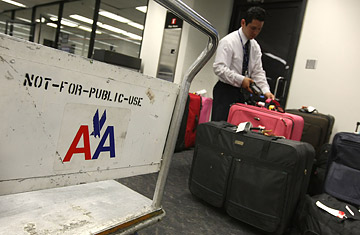
An American Airlines employee scans baggage.
No one has to tell the nation's beleaguered airlines that they have an image problem. So why has American Airlines decided to charge already unhappy passengers $15 each way for a single checked bag, as it announced Wednesday? "Desperate times beget desperate measures, and this is in the Hail Mary category," says Rick Seaney, CEO of consumer airline ticket research site Farecompare.com.
Anyone who is suffering through the pain of having to fill up their own gas tank these days can at least understand a little of that desperation. With oil prices soaring to $135 a barrel, the airlines have little choice but to pass on some of the added expense to their customers. "Current oil prices are a game-changer," says Tim Wagner, an American Airlines spokesman. "It's a tipping point. The airlines are simply not designed to handle oil at this price."
The question is whether it's better to pass on that cost via a baggage surcharge, rather than a ticket price hike. In terms of consumer psychology, the bag option may indeed be the lesser evil. On ticket-buying websites, extra fees are often not quoted in the initial price displayed to customers — only later, as they're completing their purchase. Given the advantage airlines gain by scoring better in online searches, "a price increase is a far riskier decision than going with this type of fee," says Larry Compeau, a marketing professor at Clarkson University. As Seaney puts it: "Airlines want to make it harder for consumers to compare apples to apples."
But charging for bags carries its own risks, since the the new fee will be painfully apparent to flyers every time they check in. "They've done something that violates what consumers will be expecting," says Derek Rucker, an assistant professor of marketing at Northwestern University's Kellogg School of Management, "The lower price gets the consumer to you, but [the baggage fee] might leave a more bitter taste in their mouth."
The bag surcharge could also further snarl an already arduous check-in process, and result in an upsurge in carry-on bags, meaning longer security lines and more competition for space in overhead bins. "I think you'll see passengers turning on other passengers," says Vicki Morwitz, a marketing professor at New York University's Stern School of Business, who thinks introducing the bag charge will be less palatable than rolling the cost into a pricier ticket.
Seaney of Farecompare.com expects most major carriers to jump on board with American's new plan. But "they'll probably let American stew for a couple days" to avoid the brunt of the consumer backlash, he says. United and Delta say they are considering similar charges; Continental declined to comment on American's plan. Southwest Airline — one carrier that is feeling relatively less of the pain, having locked in 70% of its 2008 oil supply at $51 a barrel — said it had "no plans" to institute a bag fee. But even Southwest expects to pay $800 million more in fuel costs in 2008 than last year (compared to United's extimated $2 billion in extra costs). "Our fuel hedges have allowed us to remain profitable, compared to other carriers, but they don't provide full protection against escalating fuel costs," says Brandy King, a spokeswoman for Southwest.
For now, American is the industry's designated whipping boy. "Their timing was lousy," says Compeau. "It comes at a time when most consumers are so focused of the increased costs of doing what they normally do that every little increase like this gets tons and tons of attention and consumers react far more violently to it than they would have one or two years ago."
—With reporting by M.J. Stephey
